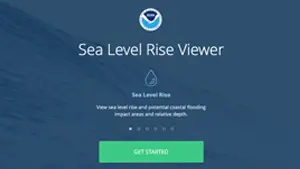 The purpose of the NOAA Sea Level Rise Viewer is to provide federal, state, and local coastal resource managers and planners with a preliminary look at sea level rise and coastal flooding impacts.
The purpose of the NOAA Sea Level Rise Viewer is to provide federal, state, and local coastal resource managers and planners with a preliminary look at sea level rise and coastal flooding impacts.
The viewer is a screening-level tool that uses best-available, nationally consistent data sets and analyses. Data and maps provided can be used at several scales to help estimate impacts and prioritize actions for different scenarios.
Viewing tools address the following topics:
- Sea Level Rise
- Local Scenarios
- Mapping Confidence
- Marsh Migration
- Vulnerability
- High Tide Flooding
The data and maps in this tool illustrate the scale of potential flooding, not the exact location, and do not account for erosion, subsidence, or future construction. Water levels are shown as they would appear during the highest high tides (excludes wind-driven tides). The data, maps, and information provided should be used only as a screening-level tool for management decisions. As with all remotely sensed data, all features should be verified with a site visit. The data and maps in this tool are provided “as is” without warranty to their performance, merchantable state, or fitness for any particular purpose. The entire risk associated with the results and performance of these data is assumed by the user. This tool should be used strictly as a planning reference tool and not for navigation, permitting, or other legal purposes.
Click here to view the resource.




